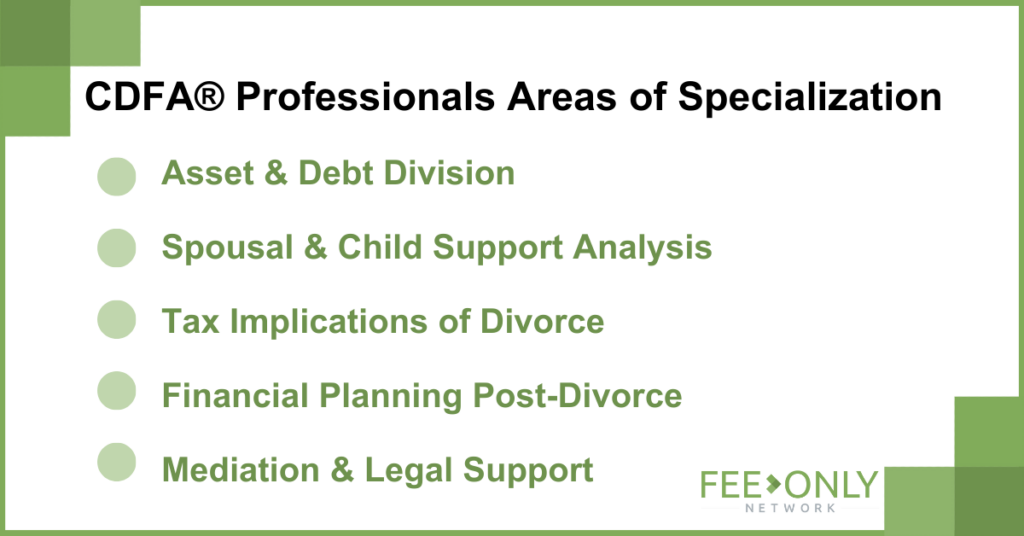
Updated: February 13, 2025

What Is a Certified Divorce Financial Analyst (CDFA®)?
A Certified Divorce Financial Analyst (CDFA®) is a financial professional who specializes in divorce-related financial planning, helping clients navigate the complexities of asset division, alimony, child support, and tax implications. CDFA practitioners provide financial expertise that complements legal counsel, ensuring equitable settlements based on long-term financial projections. They analyze the impact of different divorce settlement options, helping clients make informed decisions regarding their financial future.
CDFA® professionals work with individuals, couples, attorneys, and mediators to provide financial clarity during divorce proceedings. Their expertise includes:
The CDFA® designation is awarded by the Institute for Divorce Financial Analysts (IDFA®). To obtain the credential, financial professionals must:

A CDFA® practitioner provides financial expertise that helps divorcing individuals make informed decisions about their future. Benefits include:
A Certified Divorce Financial Analyst (CDFA®) plays a vital role in ensuring that divorce settlements are financially sound and equitable. By working with a CDFA® professional, individuals can better navigate the financial complexities of divorce and plan for a stable future.
Governing Body: The Certified Divorce Financial Analyst (CDFA®) designation is granted by the Institute for Divorce Financial Analysts (IDFA®). Learn more at www.institutedfa.com.
What is the difference between a CDFA® and a divorce attorney? A CDFA® specializes in the financial aspects of divorce, while a divorce attorney focuses on legal proceedings. CDFA®practitioners work alongside attorneys to provide financial clarity in settlement negotiations.
How much does it cost to hire a CDFA®? CDFA® fees vary based on experience and location, ranging from hourly rates of $150-$450 or flat fees for specific services.
Can a CDFA® help with child support calculations? Yes, CDFAs analyze income, expenses, and custody arrangements to assess fair and sustainable child support payments.
Do I need a CDFA® if I already have a financial planner? While financial planners provide general financial advice, CDFAs specialize in divorce-related financial issues, offering in-depth expertise on settlement impacts.
Is a CDFA® certification recognized nationwide? Yes, the CDFA® designation is recognized across the U.S. and Canada, with professionals adhering to IDFA® standards and guidelines.

Allan Slider is the Founder of FeeOnlyNetwork.com, a one-of-a-kind digital platform that elevates the visibility of fee-only financial advisors, individually and collectively. Fee-Only advisors are ONLY compensated by the client and NEVER make commission by selling financial products, or receiving kickbacks from brokerage firms. Allan is a consumer & investor advocate and a 20+ year veteran of online marketing for financial advisors.

If you're seeing this message, it's because the web browser you're using to access our site is much older and no longer supported. Due to privacy and safety concerns, we don't allow older browsers to access our site. In order to access WhyFiduciary.com, please use a newer browser, like Internet Explorer 10 or above, Google Chrome, or Mozilla Firefox.
Download a newer browser